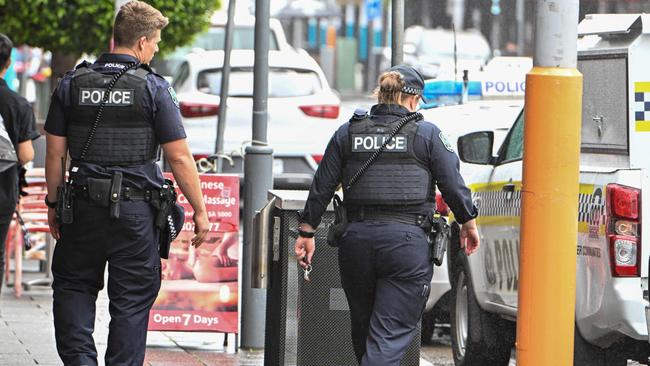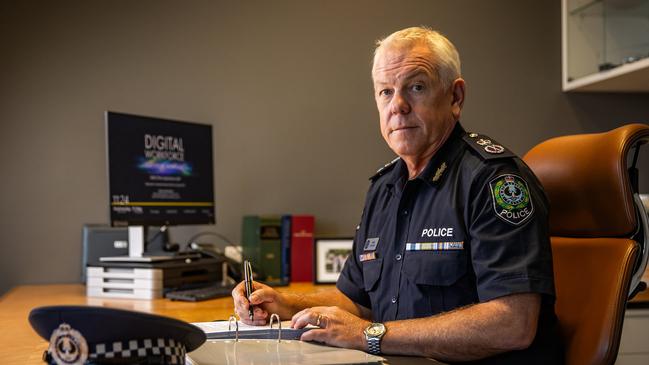SA Police will detail harrowing mental health impacts to a parliamentary committee
Police mental health exposure and support will be reviewed in a parliamentary inquiry, making sure enough is done for South Australian cops.
SA News
Don't miss out on the headlines from SA News. Followed categories will be added to My News.
Former and current police officers will detail the harrowing mental health impacts of their jobs, including one sergeant who attended the deaths of six children in three months, to a parliamentary committee on Wednesday.
The Select Committee on Support and Mental Health Services - established in early 2023 - has already received dozens of written submissions from officers.
This includes one submission from a Crime Scene Investigator, provided earlier this year, which revealed the psychological toll of attending traumatic incidents.

The investigator wrote that he believed he was capable of “dealing with the psychological issues that attending these sorts of scenes produced” after working as a patrol officer in Northern Ireland for eight years before joining SA Police in 2006.
However, he said that attending the deaths of children in South Australia caused a huge impact on his mental wellbeing.
“The first sign of trouble for me was when my team suffered an unprecedented number of child deaths,” he wrote.
“After the sixth death in three months I decided I could not attend another for some time.”
He requested time off – which was unusual – but his supervisor granted it.
However, upon returning from his mental health break, he had to investigate the death of a seven-week-old baby and on the next night, the death of a nine-year-old boy.
In between the end of the baby’s post mortem and the exam of the young boy, the police officer reported feeling unwell to his supervisor and asked to be replaced.
He claims the supervisor said there was no one available, forcing the man to return to the mortuary.
“That’s when the chest pains started. The crushing pain. The sinking sensation in my bowels. The loss of fine motor function. The babbling to the pathologist as I dressed in my mortuary gown,” he said.
“These were some of the symptoms that I suffered as I went into my first panic attack.
“This would not be the last.”
Commissioner Grant Stevens addressed the select committee in March of this year, where he said there are a lot of police officers who are exposed to traumatic incidents.

“We have people working in specialist areas that carry levels of significant risk in terms of exposure to traumatic incidents or graphic material, and even many of our civilian employees are exposed to the same type of material that could cause some sort of trauma,” he said.
“There is always capacity to do more and to be more interventionist and more proactive, but we do operate within a budget and I believe that we are expending that budget as effectively as possible to make sure that we provide as much service to our people.”
Mr Stevens said police officers are encouraged to reach out to EAS if they need support.
However, the Crime Scene Investigator in his submission said his “previous experience with EAS were less than inspiring” with the psychologist often simply acknowledging him to suffer from stress and anxiety, – before sending him back to work.
“The EAS support was poor,” he wrote. “They are a triage service only.
“They are aware that they are not the best funded or equipped to help the variety of problems facing police.
“The problem is that they direct any psychological or mental health problems to a service which provides a generic psychologist.
“Someone who does not understand the actual work of a police officer or of PTSD.”
The CSI said he has since sought psychological help outside of the organisation, which SAPOL paid for after he was advised to get a Work Capacity Certificate.
“But ‘how has SAPOL cared for me?’” he wrote, “Well despite never having missed a day of work I am a burden. One they wish to relieve themselves of as quickly as possible.”
He said he continues to suffer from panic attacks over any child related death, he cannot return to the mortuary, and “the smell of the cleaning chemicals at the butcher counter in Woolworths” sends him running outside.
“I was a mess, but I never stopped working,” he said.
The parliament committee will continue its investigation into the effectiveness of the Employee Assistance Program (EAP), and review the sufficiency of an annual psychological review for employees where the psychological demand is greater.
It will also be exploring SAPOL’s resourcing and recruitment issues.





